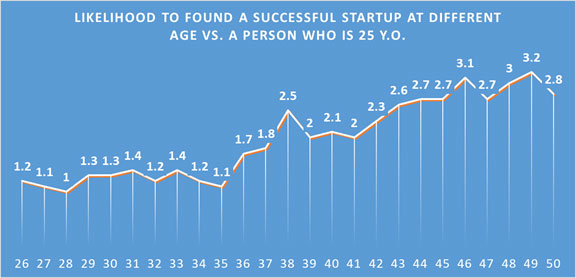We know that assessing a startup potential is a very challenging task. Many factors play a crucial role but there is one beyond others: the team and the founders.
Startups are about bringing to life an idea with the potential of completely disrupting an existing industry. That’s probably the reason why we tend to imagine their founders characterized by that braveness that is normally associated with youth. Furthermore, we have clear in the mind the picture of Bill Gates, Steve Jobs, and Mark Zuckerberg, all in their twenties when they built their multibillion dollar companies.
As highlighted by HBR[1], also looking at the winners of TechCrunch awards over the last decade, the average age at the time of founding was just 31.
Jack Ma, founder himself of Alibaba at just 34 years old, believes that passed the 40s also the entrepreneurial train has passed and it’s too late to tap into startup arena.[2]
A study conducted by the Census Bureau and two MIT professors[3] proves that the most successful entrepreneurs tend to be in their 40s.
By screening the data of 2.7M founders the researches found that the average founder was 45 at the time of founding. And is not only about statistical incidence; it is about success rate. According to the study a 40-year-old startup founder is 2.1 times more likely to found a successful startup as a 25-year-old.

Chart-age-of-founders
The reason behind liaise in the crucial advantage that experience brings. Middle-aged entrepreneurs simply have more attempts than their younger counterparts and having tried before – sometimes even having failed before – is key for present success.
Moreover, even if we tend to associate startups with the ability of generating innovative ideas for which we see youthfulness as a main enabler, a great execution proves to be much more effective indicators to success than the date on your birth certificate. Skills and network, know how and competencies are all skills increasing over time if properly nurtured.
Despite data proves that entrepreneurs have more chance to succeed in their middle age, our culture also rewards stories about the young and many venture capitalists have openly stated their preference for young founders. VC Vinod Khosla declared in 2011 that “People over 45 basically die in terms of new ideas.”[4]
The importance of the perception associated with age is also emerging from the 2018 Atomico/Slush report[5] where 40% of the respondents of their survey have experienced discrimination based on age.
Gladly the MIT research proves wrong this perception of “too old to be a founder” but even more does the reality with many cases of successful entrepreneurs who founded their companies after 40s of which, the below list, is just a short sample.
Jim Kimsey, co-founded AOL at 46 years old
Bob Parsons, founder of GoDaddy at 47 years old
Bernie Marcus, co-founded Home Depot at 50 years old
Chip Wilson began Lululemon at 42 years old
Lynda Weinman co-founded Lynda.com at 40 years old
Donald Fisher co-founded Gap at 41 years old
[1] https://hbr.org/2018/07/research-the-average-age-of-a-successful-startup-founder-is-45
[2] https://www.youtube.com/watch?v=Rajbpz2BA_g
[3] https://insight.kellogg.northwestern.edu/article/younger-older-tech-entrepreneurs
[4] https://www.washingtonpost.com/gdpr-consent/?destination=%2fnational%2fon-innovations%2fthe-case-for-old-entrepreneurs%2f2011%2f12%2f02%2fgIQAulJ3KO_story.html%3f&utm_term=.0668c31c4ad0
[5] https://www.atomico.com/the-2018-state-of-european-tech-report-is-live/ C

